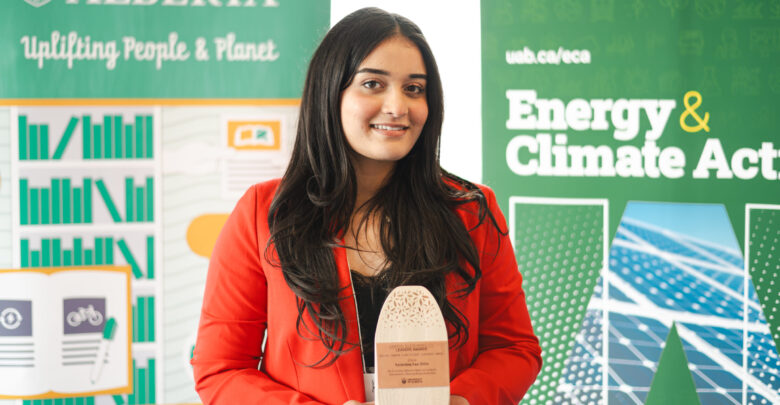Humans of UAlberta: Kairan Dhillon
“I wanted to save Earth, even if it could be through small actions that I do in daily life,” recipient of 2024 Campus Sustainability Leaders Award says.
 Hussain Al-Rikabi
Hussain Al-RikabiWhen current undergraduate student Kairan Dhillon began her studies at the University of Alberta, majoring in psychology and minoring in biological sciences, she was met with new perspectives on sustainability.
“Coming from India to Canada to study opened up many doors for me to understand sustainability and also implement it in my own life,” Dhillon said.
Dhillon’s passion for sustainability began in her second year through volunteering with Sustain SU. A U of A Students’ Union (UASU) initiative, Sustain SU provides opportunities for students to practice and promote sustainability. She currently serves as a Sustainable Action Team leader for Sustain SU. In her role, she oversees the Reusable Dish Program, Campus Gardens, the Bike Library and Workshop, and the Green for Good Market.
“I wanted to save Earth, even if it could be through small actions that I do in daily life.”
As a recipient of the 2024 Campus Sustainability Leaders Award, Dhillon was recognized for her efforts towards sustainability.
Green Flow Period Pantry supplies sustainable menstrual products to U of A students
When Dhillon enrolled herself in the certificate in sustainability, she began to research sustainable menstruation for her capstone project. During her research, she became aware of the environmental harm caused by regular menstrual products, she said.
“Normal plastic tampons and pads are accumulating way too much landfill waste,” Dhillon said.
Dhillon’s interest in sustainable menstruation and menstrual equity led her to create the Green Flow Period Pantry. This initiative supplies free, sustainable menstrual products to U of A students, available for request through an online form. In collaboration with Club Periodically, Green Flow Period Pantry also provides menstrual product baskets throughout North Campus.
University students face an economic barrier to accessing sustainable products, according to Dhillon. Providing the opportunity for sustainable menstruation by fulfilling students’ product requests has been rewarding for her.
“Every single university, every single school, I would say, requires menstrual products that are provided for everyone, for free,” she said.
“I want to see more products that are inclusive for menstruating individuals,” Dhillon says
Receiving requests from non-binary and transgender students for more inclusive menstrual products expanded Dhillon’s approach to providing menstrual products. Prioritizing inclusivity is a major goal of her initiative.
“I want to see more products that are inclusive for menstruating individuals,” Dhillon added.
Hesitancy to use unfamiliar products is another barrier to sustainable menstruation, Dhillon said. One of her goals for the upcoming academic year is to organize “sexual and reproductive health-focused workshops around campus” to teach students how to use sustainable menstrual products.
Hearing from students who appreciate the Green Flow Period Pantry’s efforts motivates Dhillon to continue “helping menstruating individuals the way they should be helped.”




